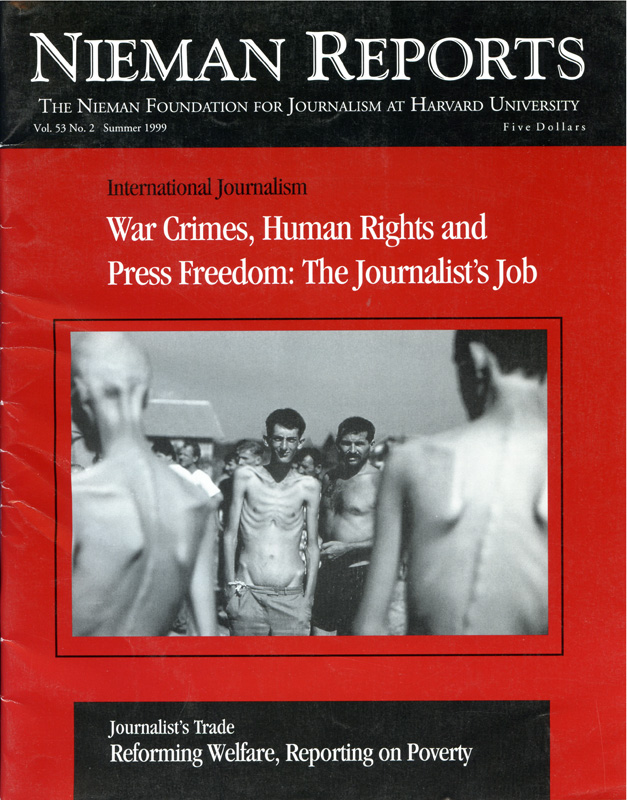Journalist’s Trade
Public debate about welfare—its failings, its future and its families—which had been the subject of so much media coverage for so long, was transformed into a different challenge for journalists in August 1996 when President Clinton signed the Personal Responsibility and Work Opportunity Act. Welfare reform replaced welfare “as we know it,” and now a plethora of state initiatives are emerging to move people off of welfare and into the labor market. Now, editors, writers, producers and correspondents have had to think anew about how to report on this extraordinary shift in social policy and its affects on people in various communities.
Bill Kovach, Nieman Curator, focused his remarks at a Casey Journalism Center for Children and Families conference on the intersection of various strategies that reporters can use to chronicle this important and evolving story. Lynda McDonnell, who covered welfare and social policy at The St. Paul Pioneer Press, offers hints about how to weave the economic, social and political strands of this complex story. Joe Rodriguez, a columnist for The San Jose Mercury News, writes about the need for journalists to bear in mind the impact of immigration reform and the role cultural politics play in their coverage of Latinos and welfare reform. William Wong, a freelance columnist with The San Francisco Examiner, explains that members of the mainstream press don’t do well at capturing experiences of Asian-Americans brought about by welfare reform. Franklin D. Gilliam, Jr., a political science professor at the University of California, Los Angeles, reports on findings from the first study of broadcast media to examine ways in which reporting of welfare reform is affected by perceptions of race and gender, especially when it comes to African-Americans. Pat Gish, Editor of The Mountain Eagle, a weekly newspaper in Appalachia, finds that few newspapers there track the story of welfare reform, and poverty remains a constant and difficult story to tell. And Martha Shirk, a former newspaper reporter who has written a soon-to-be published book about working poor families, offers some suggestions for those who want to do more reporting on poverty. Finally, from Europe, Martin Gehlen, an editor and writer at a Berlin newspaper, who wrote a book about U.S. welfare reform, reports on how European reporters are looking closer to home (rather than to the United States) for stories about how to solve their countries’ problems with social spending.
Public debate about welfare—its failings, its future and its families—which had been the subject of so much media coverage for so long, was transformed into a different challenge for journalists in August 1996 when President Clinton signed the Personal Responsibility and Work Opportunity Act. Welfare reform replaced welfare “as we know it,” and now a plethora of state initiatives are emerging to move people off of welfare and into the labor market. Now, editors, writers, producers and correspondents have had to think anew about how to report on this extraordinary shift in social policy and its affects on people in various communities.
Bill Kovach, Nieman Curator, focused his remarks at a Casey Journalism Center for Children and Families conference on the intersection of various strategies that reporters can use to chronicle this important and evolving story. Lynda McDonnell, who covered welfare and social policy at The St. Paul Pioneer Press, offers hints about how to weave the economic, social and political strands of this complex story. Joe Rodriguez, a columnist for The San Jose Mercury News, writes about the need for journalists to bear in mind the impact of immigration reform and the role cultural politics play in their coverage of Latinos and welfare reform. William Wong, a freelance columnist with The San Francisco Examiner, explains that members of the mainstream press don’t do well at capturing experiences of Asian-Americans brought about by welfare reform. Franklin D. Gilliam, Jr., a political science professor at the University of California, Los Angeles, reports on findings from the first study of broadcast media to examine ways in which reporting of welfare reform is affected by perceptions of race and gender, especially when it comes to African-Americans. Pat Gish, Editor of The Mountain Eagle, a weekly newspaper in Appalachia, finds that few newspapers there track the story of welfare reform, and poverty remains a constant and difficult story to tell. And Martha Shirk, a former newspaper reporter who has written a soon-to-be published book about working poor families, offers some suggestions for those who want to do more reporting on poverty. Finally, from Europe, Martin Gehlen, an editor and writer at a Berlin newspaper, who wrote a book about U.S. welfare reform, reports on how European reporters are looking closer to home (rather than to the United States) for stories about how to solve their countries’ problems with social spending.



